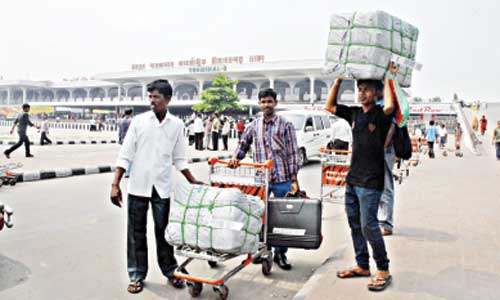Remittance inflow drops in five months
Remittance inflow decreased by 0.68 per cent in the first five months of the financial year 2015-16 compared with that in the same period of the FY15 which might put an adverse impact on the country’s socio-economic situation. According to the Bangladesh Bank data released on Wednesday, the remittance inflow figure was $6.16 billion in July-November this fiscal year against $6.21 billion in the corresponding period of the FY15. Policy Research Institute executive director Ahsan H Mansur told New Age on Wednesday that it was a matter of concern that the country’s inward remittance has been maintaining a declining trend for the last few months. The inflow of inward remittance puts a positive impact on the country’s socio-economic situation than that of export earnings, he said. The earnings from the export products are usually enjoyed by some businesspeople and a segment of workers, but the remittance boosts up the country’s rural economy, he explained. A large number of rural people are now depending on remittances as they spend their cost of health and education from the remittance inflow, Mansur said. The BB data showed that the inward remittances also decreased to $1.13 billion in November against $1.18 billion in the same month of the last financial year. Mansur said, ‘One of the major causes of decreasing the inward remittances is the lower price of petroleum products on the global market.’ The country’s majority number of the workers is now working in Middle-East and the economy of the region (Middle-East countries) mainly depend on the income of petroleum products, the economist said. The lower cost of petroleum products has hit business of the Middle-East, resulting in squeezing of their spending. Many Bangladeshi workers in the Middle-East countries are now being paid lower wages compared with the previous periods due to dull business, he noted. Besides, the government has also failed to export human resources to new markets like Malaysia, said the economist. The government should take prompt action to expand the new markets to export its human resources in a bid to boost up the inward remittances, Mansur said. According to the BB data, the private commercial banks received $777.23 million in inward remittances in November while the state-run commercial banks received $332.63 million, foreign commercial banks $14.28 million, and specialised development banks got $13.40 million. In November, Islami Bank Bangladesh received the highest amount of remittances — $254.61 million —
- See more at: http://newagebd.net/180885/remittance-inflow-drops-in-five-months/#sthash.Hk4uLjy4.dpuf











